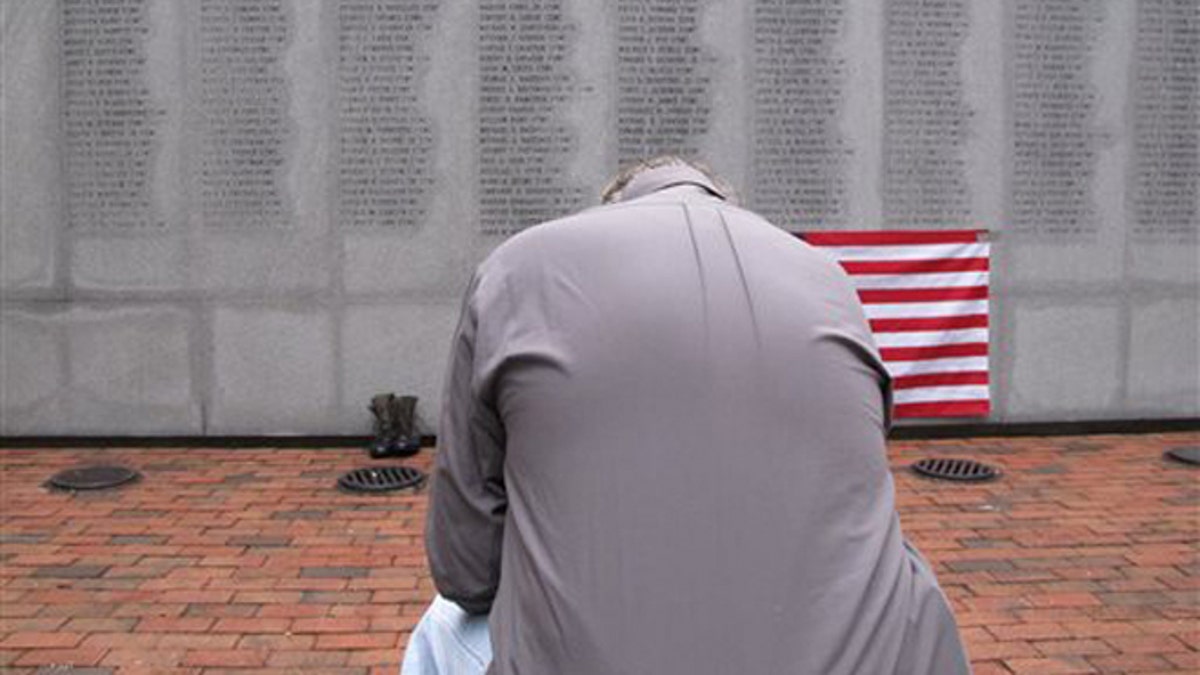
Oct. 23, 2013: Former Marine Ed Ayers of Scranton, Penn., hangs his head and weeps at the Beirut Bombing Memorial in Jacksonville, N.C. Wednesday was the 30th anniversary of a terrorist bombing that killed 241 U.S. service members. Ayers, who did two tours in Lebanon, said the peacekeeping mission there was worth it but, "I wish it was handled differently." (AP Photo/Allen G. Breed)
Thirty years ago, on October 23, 1983, suicide bombers drove a truck into the U.S. Marine barracks in Beirut Lebanon, killing 241 sleeping American servicemen. It was the largest surprise attack on Americans since Pearl Harbor, and remained so until Sept 11, 2001.
The Marine Barracks bombing was an early sign of the nascent movement of jihadist terrorists in the Middle East, but it was also a wakeup call to the Reagan Pentagon that they needed to analyze why, how and when U.S. forces should be sent into combat.
Many in the armed forces, especially my boss Secretary of Defense Caspar Weinberger, were haunted by the specter of Vietnam a decade before -- a war we inched our way into with no clear idea of what we hoped to accomplish nor the resources we would need to do so.
[pullquote]
If anyone had told President Johnson in 1974 that the Vietnam War would last nearly a decade, cost 50,000 American lives, nearly destroy the American military, tear America apart, and result in an American defeat, he would never have been drawn into it.
Some in the Reagan administration urged the president to deepen our involvement in the Middle East and send more American troops into the civil war in Lebanon.
However, many in the Reagan Defense Department urged caution, worried the Beirut bombings could launch us on trajectory similar to that of Vietnam.
They worried if we sent more troops into Lebanon, it would be a military escalation with no clear mission, no defined enemy and in a country that, while important, was not of vital national interest to the United States.
Secretary Weinberger asked me to draft a speech laying out the principles under which the United States should go to war.
I canvassed the senior military leadership in the Pentagon, the generals and admirals who had been junior officers in the 1970s. What mistakes had we made along the way in Vietnam and how could we avoid them in any future commitment of combat forces abroad?
Their thoughts led to the speech the Secretary of Defense gave in November 1984, which was dubbed "The Weinberger Doctrine." Its principles guided how, why and when the Reagan administration would go to war.
The Reagan administration believed we should go to war only to protect a vital national interest, only if we have a clearly defined goal, only if we are willing to commit enough resources to achieve the goal, only if we are upfront with the American people about its cost in lives and treasure.
In other words, if the American people weren't willing to do whatever it took to win, then we shouldn't go to war.
If we weren't in it to win it, we shouldn't begin it.
It was a conservative doctrine, deliberately designed by Secretary Weinberger to be cautious about committing America to war.
Reagan did not get involved in a Middle East war, and ultimately withdrew U.S. forces from Lebanon.
Some argue that Reagan's refusal to engage Hezbollah and Islamic jihadists in the 1980's led to the growth of Al Qaeda. Others argue that had Reagan gotten bogged down in a Middle East war, he couldn't have defeated the Soviet Union and won the Cold War.
In any event, after the September 11th attacks, the George W. Bush administration NeoCons dismissed the Weinberger Doctrine as too limiting in the new world of Al Qaeda and terrorists. They returned America to wars of intervention.
But ten years and two lost wars later, the Weinberger Doctrine is getting a second look. Turns out the lessons of Vietnam were to become the lessons of Iraq.
Thirty years after the Marine Barracks bombing, Arab countries are still fighting civil wars, and the U.S. is still trying to figure out what our role should be.
History has a way of repeating itself. Or, the tragic old adage claims, those who don't learn from history are doomed to repeat it.








































